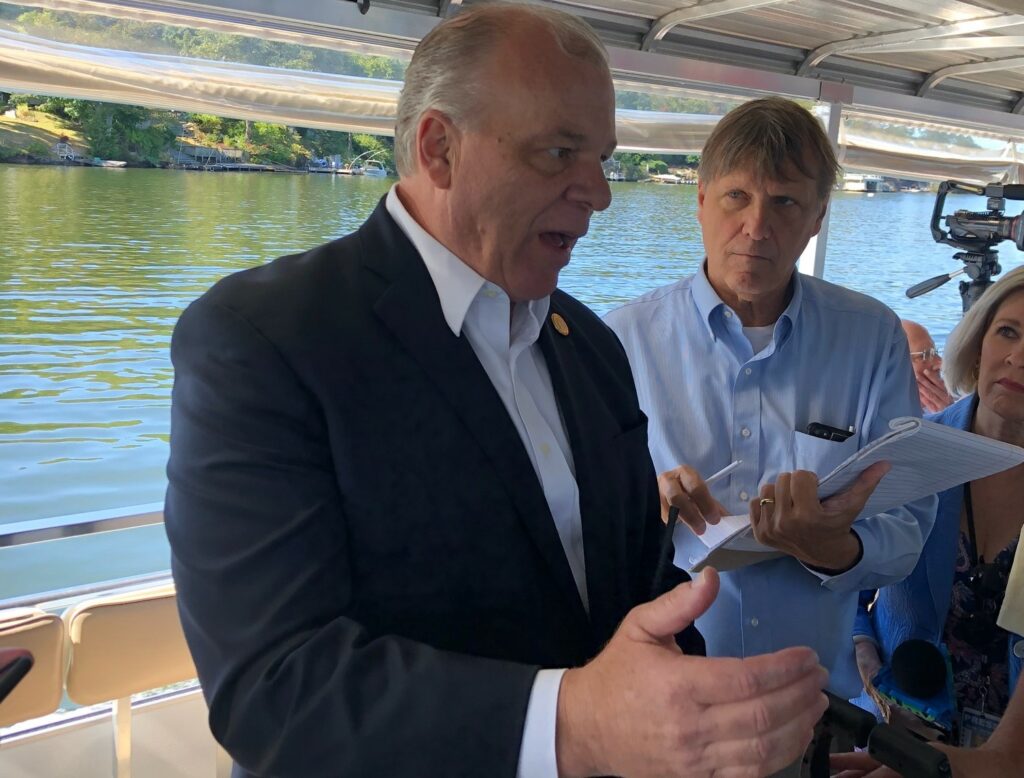Sweeney & Greenstein Call for Action on Clean Water

Sweeney & Greenstein Call for Action on Clean Water
Senators: We must expedite $100M in bond money to protect drinking water in schools & move on other water safety initiatives
Trenton – Senate President Steve Sweeney and Senator Linda Greenstein today called for action on a range of initiatives to protect the state’s drinking water supplies, including expedited action on the $100 million in bond money to protect drinking water in schools.
“When voters approved the Securing Our Children’s Future Bond Act, they expected action to protect schoolchildren from exposure to contaminated water,” said Senator Sweeney (D-Gloucester/Salem/Cumberland). “Yet here we are, 11 months later, and there are no guidelines for school districts to apply for the money and no indication by the Treasury Department of when it will go out to the bond market. There is an urgency to this need and to the importance of acting on other clean water initiatives.”
Senator Greenstein (D-Middlesex/Mercer), who co-chaired the Joint Legislative Task Force on Drinking Water Infrastructure, and Senator Singleton (D-Burlington), chair of the Senate Community and Urban Affairs Committee, which has been holding hearings on enforcement of the Water Quality Accountability Act, said more needs to be done to enforce existing laws.
“The crisis with lead in the water that has forced Newark residents to rely on filters and bottled water should make it clear that more needs to be done to protect all of our residents,” Senator Greenstein said. “This isn’t just a Newark crisis. It is a crisis that potentially affects children in urban, suburban and rural towns with century-old pipes carrying harmful lead.”
While Newark’s drinking water crisis has made national news, the problem of lead-contaminated pipes in aging water systems is a statewide problem, the senators said.
“Two years ago, the Legislature passed the Water Quality Accountability Act. Yet, over the past several weeks, we had a series of hearings to understand why it has not been fully implemented, and what more can be done to ensure that our drinking water is safe and that our water infrastructure is modernized,” said Senator Singleton. “Not one more day can go by where this water crisis is not addressed. The time to act is now.”
Senator Sweeney joined Senate colleagues in writing to the Administration to ask for an accounting of the bond act, but they have not received a response. Senator Sweeney praised the Education Law Center, which advocates for the poorest urban districts, for urging the state to expedite release of the bond money.
Senator Sweeney noted that the DOE three years ago required all school districts to test their drinking water for lead, which was followed in 2017 with legislation providing funding for both public and non-public school districts to cover the cost of testing.
While the information showing that lead-tainted water was detected in nearly a third of the 673 public school districts and charter schools, it was never made widely available. A USA Today report found that 480 schools have reported high levels of lead since 2016.
Given the magnitude, it is unclear why only $3.3 million of the $10 million allocated by the Legislature in the FY2018 budget to cover the cost to New Jersey school districts of testing drinking water has been used, or why the administration hasn’t requested these funds be allowed for remediation purposes as well.
The senators also criticized the Schools Development Authority for rejecting requests for help by the Newark and Camden schools, two communities that have experienced some of the most critical problems.
The senators outlined other actions that should be taken to address the issue:
- Get the $100 million in funding approved by the voters from the Securing Our Children’s Future Bond Act out to New Jersey’s schools;
- Immediately begin to draft regulations for the water infrastructure funding in order to start work on the projects;
- Ensure that any school district with contamination that does not have a corrective action plan be funded to complete one;
- Compile and publish all school drinking water reports and testing schedules of schools on DOE website in an accessible way;
- Work to determine the appropriate level of funding needed for ongoing testing reimbursements;
- Make use of the full $10 million allocated by the Legislature to cover the cost to New Jersey school districts of testing drinking water;
- Enforce the Water Quality Accountability Act to monitor the quality of local water systems;
- Have the SDA review the requests for aid to fund water infrastructure improvements in schools in Newark and Camden;
- Prioritize lead service line replacement as a state-wide emergency with central coordination and management, and authorize water utilities to replace lead service lines;
- Provide management and training in corrosion control systems to prevent lead leaching;
- Direct the Drinking Water Quality Institute to adopt a state standard for lead in drinking water below federal standard of 15 parts per billion and direct the DEP to adopt outstanding recommendations by the institute;
- Adopt a standard for testing lead in water in schools and childcare centers and test schools every 3 years, as is done for child care centers;
- Have the DEP provide guidance to local governments that are waiting to roll out storm water management utility systems;
- Clean up the 212 combined sewer overflow outfalls in 21 municipalities that dump raw sewage into waterways during major storms;
- Direct the DEP to take regulatory action to reduce pollutant loads into lakes and waterways in response to the 28 lake closures.










